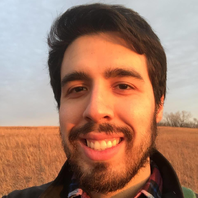


Kenneth Sandoval is working on ESR Project 7: Using an 'OMICS' approach to uncover novel biosynthetic pathways in sponges under the supervision of Dr Grace McCormack at the National University of Ireland Galway, Ireland. Overall, with his project Kenneth is aiming to identify and characterize biosynthetic pathways of haplosclerid sponges responsible for the production of secondary metabolites with anticancer, antimicrobial and antifouling properties. This includes compounds such as the unique 3-alkylpyridine derivatives which have evidence of originating from the host sponge rather than symbiotic microorganisms. To accomplish this, Kenneth's first goal is to sequence the genomes of three closely related sponges associated with these compounds: Haliclona indistincta, Haliclona sarai, and Haliclona viscosa. He plans on developing techniques to extract high-molecular-weight genomic DNA from sea sponges suitable for long-read sequencing technology. Following this, methods such as genome-mining and molecular networking will be used to identify the genes responsible for the production of compounds of interest. Finally, in vitro production of the 3-alkypyridine derivatives will be attempted via growth in research aquaria or recombinant gene expression.
Before becoming a part of the IGNITE family, Kenneth has completed a BSc in Microbiology at the University of Oklahoma in the USA, where he studied hydrocarbon degrading microorganisms. Afterwards, Kenneth traveled to Europe and acquired his MSc at the Wageningen University and Research (WUR) in the Netherlands, where he studied biotechnological applications of sea sponges in collaboration with the Harbor Branch Oceanographic Institute. "Specifically, during my MSc thesis I worked with cell dissociations of the sponge Dysidea etheria with the purpose of establishing cell cultures of this organism. My MSc also required an internship for which I worked at Uppsala University in Sweden and was tasked with identifying genes responsible for antifouling compounds of the deep-sea sponge Geodia barretti via genome-mining software. I plan on utilizing the skills and knowledge acquired from my past research to accomplish the goals of ESR 7."
Kenneth's research interests can best be summarized as studying biotechnological applications of marine invertebrates and their microbial symbionts. He also stresses on a special interest in marine sponges, which have proven to be a proliferative source of secondary metabolites with pharmaceutical potential. "Specifically I wish to discover the biosynthetic pathways which allow these organisms to produce such secondary metabolites as well as develop methods of in vitro production of said metabolites." In line with his research interests, Kenneth also enjoys activities in the ocean such as snorkeling and diving. After science, cooking is his second passion and he is enthusiastic about tasting new flavors and learning new recipes from around the world.
Institution: National University of Ireland GalwayBefore becoming a part of the IGNITE family, Kenneth has completed a BSc in Microbiology at the University of Oklahoma in the USA, where he studied hydrocarbon degrading microorganisms. Afterwards, Kenneth traveled to Europe and acquired his MSc at the Wageningen University and Research (WUR) in the Netherlands, where he studied biotechnological applications of sea sponges in collaboration with the Harbor Branch Oceanographic Institute. "Specifically, during my MSc thesis I worked with cell dissociations of the sponge Dysidea etheria with the purpose of establishing cell cultures of this organism. My MSc also required an internship for which I worked at Uppsala University in Sweden and was tasked with identifying genes responsible for antifouling compounds of the deep-sea sponge Geodia barretti via genome-mining software. I plan on utilizing the skills and knowledge acquired from my past research to accomplish the goals of ESR 7."
Kenneth's research interests can best be summarized as studying biotechnological applications of marine invertebrates and their microbial symbionts. He also stresses on a special interest in marine sponges, which have proven to be a proliferative source of secondary metabolites with pharmaceutical potential. "Specifically I wish to discover the biosynthetic pathways which allow these organisms to produce such secondary metabolites as well as develop methods of in vitro production of said metabolites." In line with his research interests, Kenneth also enjoys activities in the ocean such as snorkeling and diving. After science, cooking is his second passion and he is enthusiastic about tasting new flavors and learning new recipes from around the world.
ESR Project 7: Using an 'OMICS' approach to uncover novel biosynthetic pathways in sponges